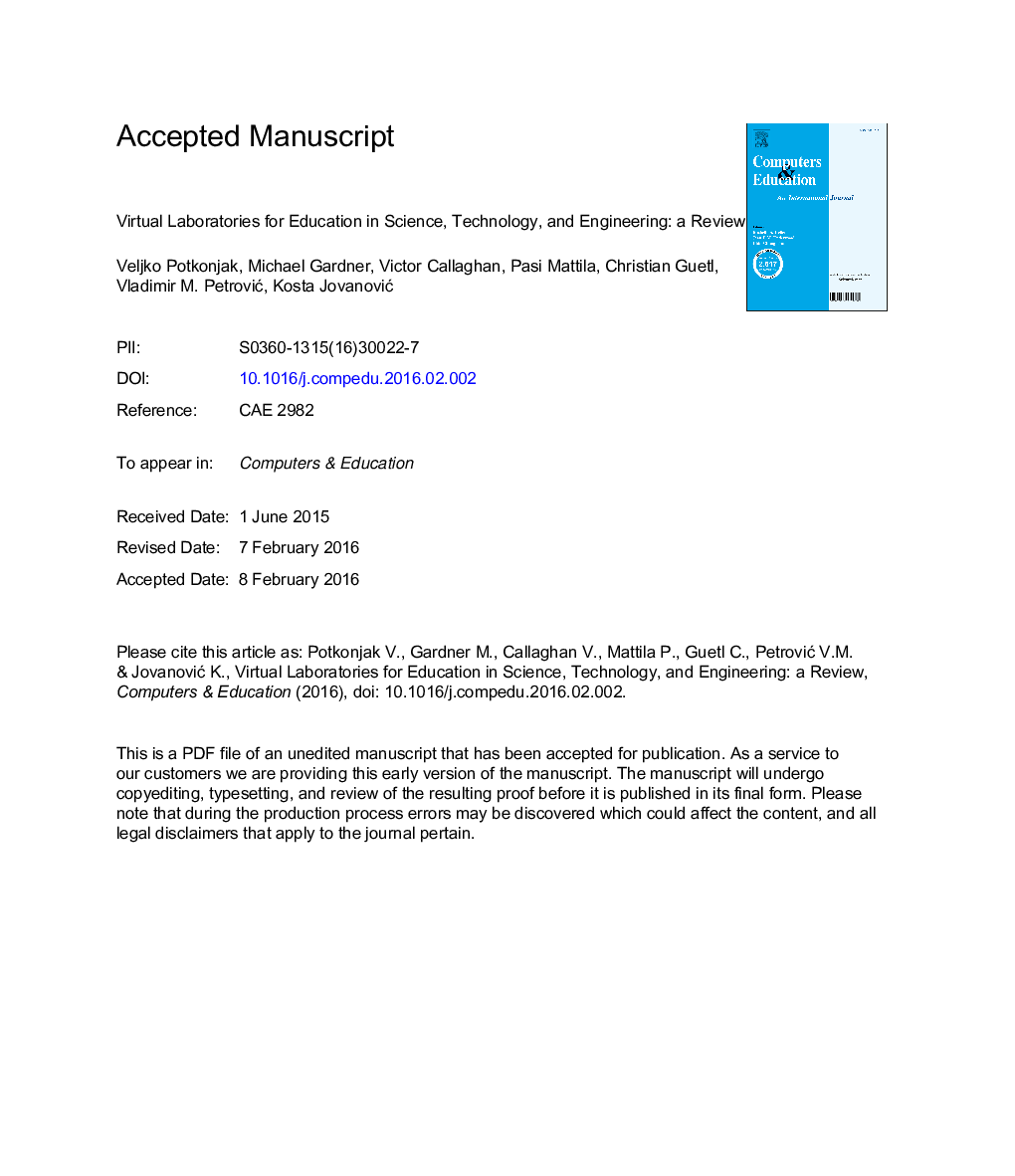| کد مقاله | کد نشریه | سال انتشار | مقاله انگلیسی | نسخه تمام متن |
|---|---|---|---|---|
| 6834924 | 618164 | 2016 | 33 صفحه PDF | دانلود رایگان |
عنوان انگلیسی مقاله ISI
Virtual laboratories for education in science, technology, and engineering: A review
ترجمه فارسی عنوان
آزمایشگاه های مجازی برای آموزش در علوم، فن آوری و مهندسی: بررسی
دانلود مقاله + سفارش ترجمه
دانلود مقاله ISI انگلیسی
رایگان برای ایرانیان
ترجمه چکیده
ما اکنون شاهد فناوری های جدید در حال ظهور هستیم که می تواند بر برخی از مشکلات بالقوه در این زمینه غلبه کند. اینها عبارتند از: گرافیک کامپیوتری، واقعیت افزوده، دینامیک محاسباتی، و دنیای مجازی. این مقاله خلاصه وضعیت هنر در آزمایشگاههای مجازی و دنیای مجازی در زمینه علوم، فن آوری و مهندسی است. فعالیت اصلی تحقیق در این زمینه ها مورد بحث قرار گرفته است، اما تاکید ویژه بر زمینه رباتیک به علت بلوغ این منطقه در جامعه مجازی آموزش و پرورش است. این یک تصادف نیست؛ روباتیک با استفاده از شخصیتی وسیع و چند رشته ای خود، یک نمونه کامل است که در آن تمام زمینه های دیگر مهندسی و فیزیک می تواند کمک کند. بنابراین، استفاده از آزمایشگاه های مجازی برای استفاده های مهندسی علمی و غیر روباتیک دیگر می تواند برای بسیاری از فرایندهای یادگیری یکسان باشد. این می تواند شامل حمایت از معرفی مفاهیم جدید به عنوان بخشی از یادگیری در مورد علم و فناوری و معرفی دانش مهندسی عمومی باشد، از طریق حمایت از فعالیت های تربیتی و آموزشی تر سازنده (و همکاری) در موضوعات مهندسی پیچیده مانند رباتیک. هدف از این مقاله این است که این فضای مشکل را به طور دقیق تر توضیح دهد و یک منبع ارزشمند از اطلاعات ایجاد کند که می تواند موقعیت جغرافیایی برای تحقیقات آینده را تعریف کند.
موضوعات مرتبط
علوم انسانی و اجتماعی
علوم اجتماعی
آموزش
چکیده انگلیسی
We are now seeing new emerging technologies that can overcome some of the potential difficulties in this area. These include: computer graphics, augmented reality, computational dynamics, and virtual worlds. This paper summarizes the state of the art in virtual laboratories and virtual worlds in the fields of science, technology, and engineering. The main research activity in these fields is discussed but special emphasis is put on the field of robotics due to the maturity of this area within the virtual-education community. This is not a coincidence; starting from its widely multidisciplinary character, robotics is a perfect example where all the other fields of engineering and physics can contribute. Thus, the use of virtual labs for other scientific and non-robotic engineering uses can be seen to share many of the same learning processes. This can include supporting the introduction of new concepts as part of learning about science and technology, and introducing more general engineering knowledge, through to supporting more constructive (and collaborative) education and training activities in a more complex engineering topic such as robotics. The objective of this paper is to outline this problem space in more detail and to create a valuable source of information that can help to define the starting position for future research.
ناشر
Database: Elsevier - ScienceDirect (ساینس دایرکت)
Journal: Computers & Education - Volume 95, April 2016, Pages 309-327
Journal: Computers & Education - Volume 95, April 2016, Pages 309-327
نویسندگان
Veljko Potkonjak, Michael Gardner, Victor Callaghan, Pasi Mattila, Christian Guetl, Vladimir M. PetroviÄ, Kosta JovanoviÄ,
